Analyzing Nurse Values, Communication, and Ethical Challenges
VerifiedAdded on 2023/06/03
|15
|1347
|374
Presentation
AI Summary
This presentation delves into the crucial role of nurses' values in influencing patient outcomes and engagement, emphasizing the significance of aligning these values with institutional goals. It examines how effective communication within the healthcare workplace enhances patient care and addresses the detrimental effects of poor communication. The presentation highlights strategies for improving communication, including active listening, clear body language, and respectful language. A case scenario illustrates an ethical dilemma faced by a nurse, balancing patient autonomy with the principle of beneficence. The presentation underscores the importance of nurses maintaining compassion, managing stress, and achieving work-life balance to ensure optimal performance and patient-centered care. Access more solved healthcare assignments and resources on Desklib.

ORGANIZATIONAL
VALUES
PRESENTED BY:
VALUES
PRESENTED BY:
Paraphrase This Document
Need a fresh take? Get an instant paraphrase of this document with our AI Paraphraser

OBJECTIVES OF THE
PRESENTATION
This presentation will address:
1. The impact of the values of a nurse on engagement and patient
outcomes.
2. The impact of communication in the workplace and ways to improve the
communication process
3. Present an instance in which nurse’s values and those of the institution
did not align and the accumulated effect that this had on the nurse and
the organization and solutions offered.
PRESENTATION
This presentation will address:
1. The impact of the values of a nurse on engagement and patient
outcomes.
2. The impact of communication in the workplace and ways to improve the
communication process
3. Present an instance in which nurse’s values and those of the institution
did not align and the accumulated effect that this had on the nurse and
the organization and solutions offered.
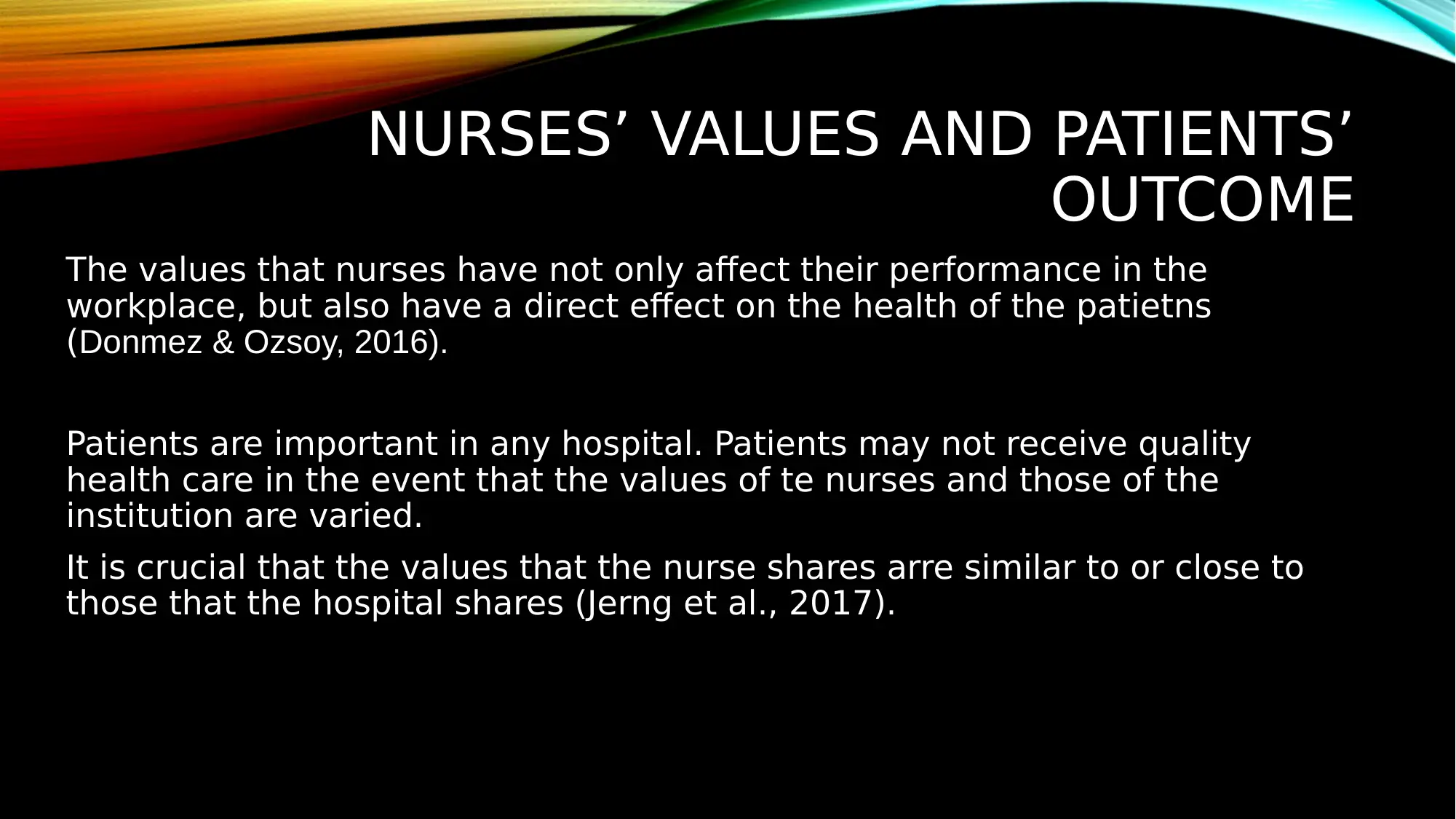
NURSES’ VALUES AND PATIENTS’
OUTCOME
The values that nurses have not only affect their performance in the
workplace, but also have a direct effect on the health of the patietns
(Donmez & Ozsoy, 2016).
Patients are important in any hospital. Patients may not receive quality
health care in the event that the values of te nurses and those of the
institution are varied.
It is crucial that the values that the nurse shares arre similar to or close to
those that the hospital shares (Jerng et al., 2017).
OUTCOME
The values that nurses have not only affect their performance in the
workplace, but also have a direct effect on the health of the patietns
(Donmez & Ozsoy, 2016).
Patients are important in any hospital. Patients may not receive quality
health care in the event that the values of te nurses and those of the
institution are varied.
It is crucial that the values that the nurse shares arre similar to or close to
those that the hospital shares (Jerng et al., 2017).
⊘ This is a preview!⊘
Do you want full access?
Subscribe today to unlock all pages.

Trusted by 1+ million students worldwide
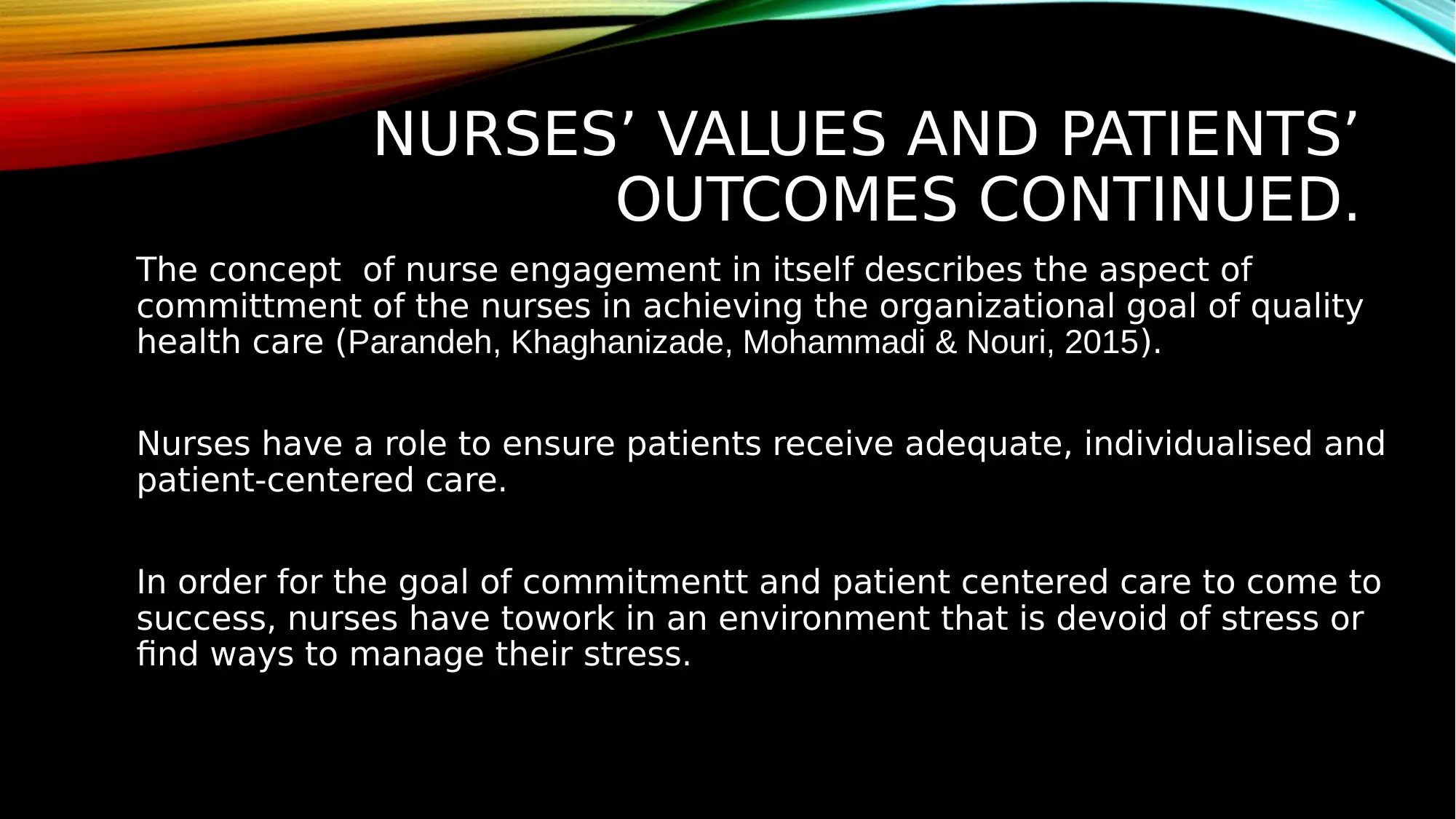
NURSES’ VALUES AND PATIENTS’
OUTCOMES CONTINUED.
The concept of nurse engagement in itself describes the aspect of
committment of the nurses in achieving the organizational goal of quality
health care (Parandeh, Khaghanizade, Mohammadi & Nouri, 2015).
Nurses have a role to ensure patients receive adequate, individualised and
patient-centered care.
In order for the goal of commitmentt and patient centered care to come to
success, nurses have towork in an environment that is devoid of stress or
find ways to manage their stress.
OUTCOMES CONTINUED.
The concept of nurse engagement in itself describes the aspect of
committment of the nurses in achieving the organizational goal of quality
health care (Parandeh, Khaghanizade, Mohammadi & Nouri, 2015).
Nurses have a role to ensure patients receive adequate, individualised and
patient-centered care.
In order for the goal of commitmentt and patient centered care to come to
success, nurses have towork in an environment that is devoid of stress or
find ways to manage their stress.
Paraphrase This Document
Need a fresh take? Get an instant paraphrase of this document with our AI Paraphraser
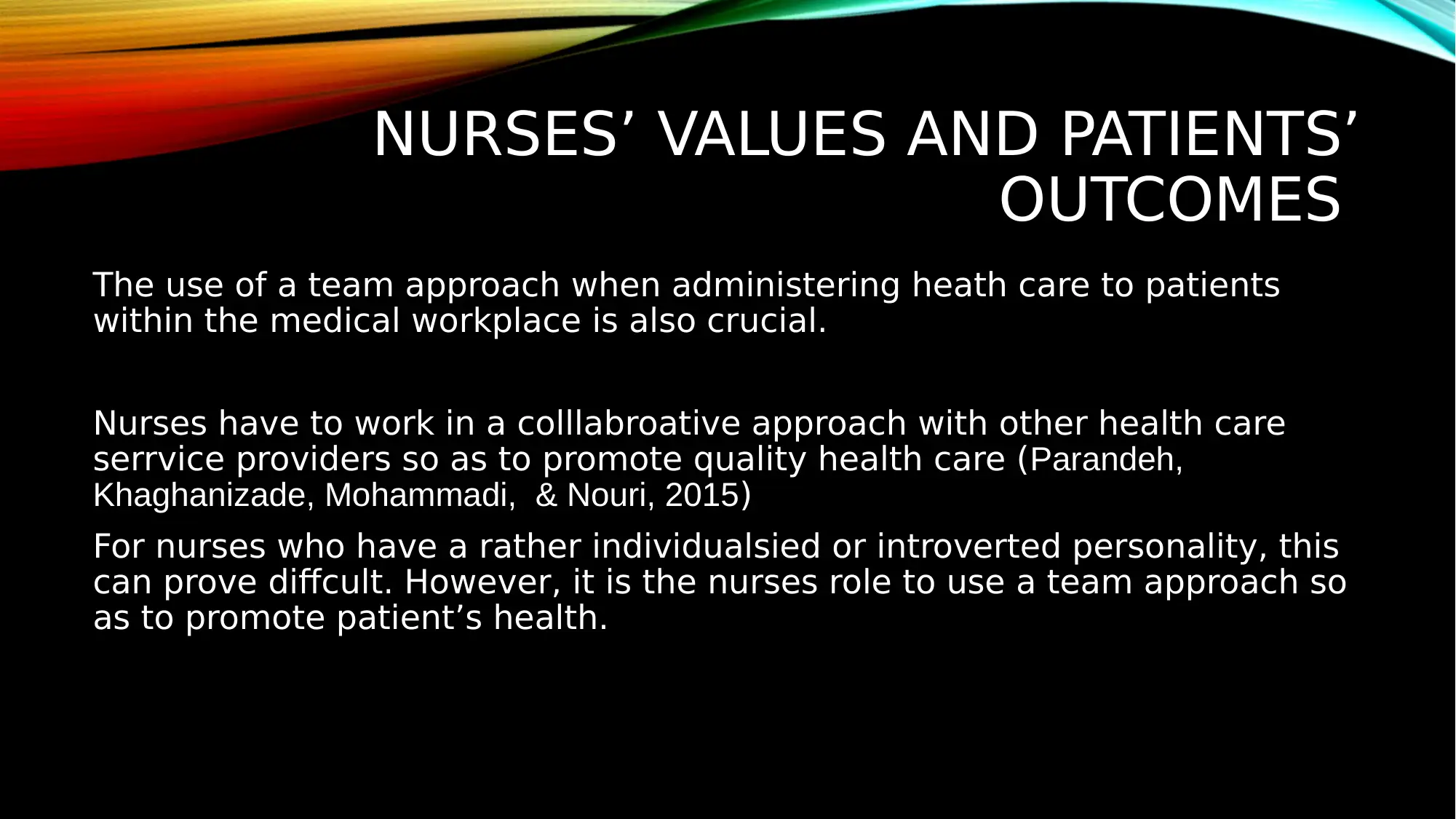
NURSES’ VALUES AND PATIENTS’
OUTCOMES
The use of a team approach when administering heath care to patients
within the medical workplace is also crucial.
Nurses have to work in a colllabroative approach with other health care
serrvice providers so as to promote quality health care (Parandeh,
Khaghanizade, Mohammadi, & Nouri, 2015)
For nurses who have a rather individualsied or introverted personality, this
can prove diffcult. However, it is the nurses role to use a team approach so
as to promote patient’s health.
OUTCOMES
The use of a team approach when administering heath care to patients
within the medical workplace is also crucial.
Nurses have to work in a colllabroative approach with other health care
serrvice providers so as to promote quality health care (Parandeh,
Khaghanizade, Mohammadi, & Nouri, 2015)
For nurses who have a rather individualsied or introverted personality, this
can prove diffcult. However, it is the nurses role to use a team approach so
as to promote patient’s health.
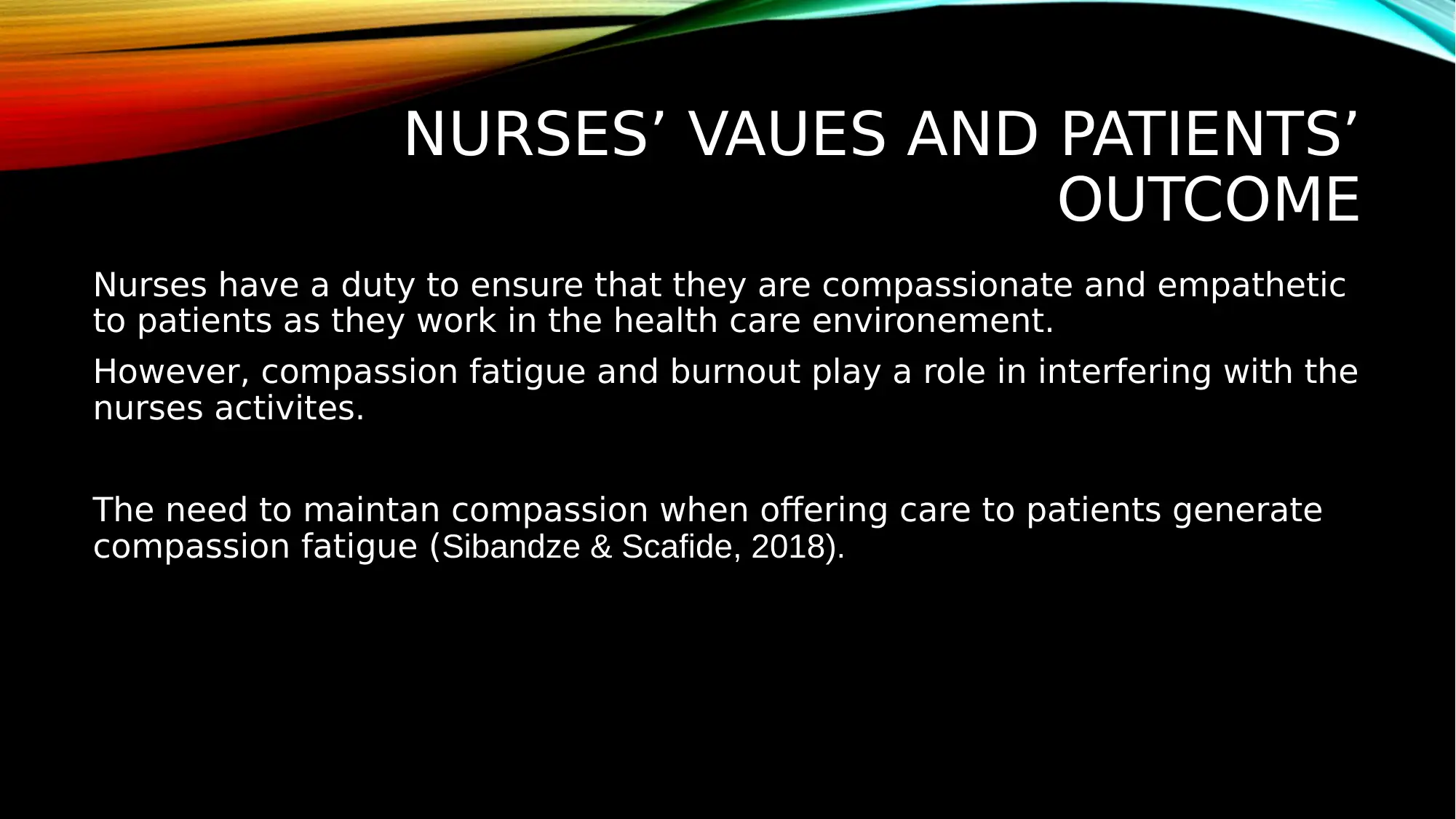
NURSES’ VAUES AND PATIENTS’
OUTCOME
Nurses have a duty to ensure that they are compassionate and empathetic
to patients as they work in the health care environement.
However, compassion fatigue and burnout play a role in interfering with the
nurses activites.
The need to maintan compassion when offering care to patients generate
compassion fatigue (Sibandze & Scafide, 2018).
OUTCOME
Nurses have a duty to ensure that they are compassionate and empathetic
to patients as they work in the health care environement.
However, compassion fatigue and burnout play a role in interfering with the
nurses activites.
The need to maintan compassion when offering care to patients generate
compassion fatigue (Sibandze & Scafide, 2018).
⊘ This is a preview!⊘
Do you want full access?
Subscribe today to unlock all pages.

Trusted by 1+ million students worldwide
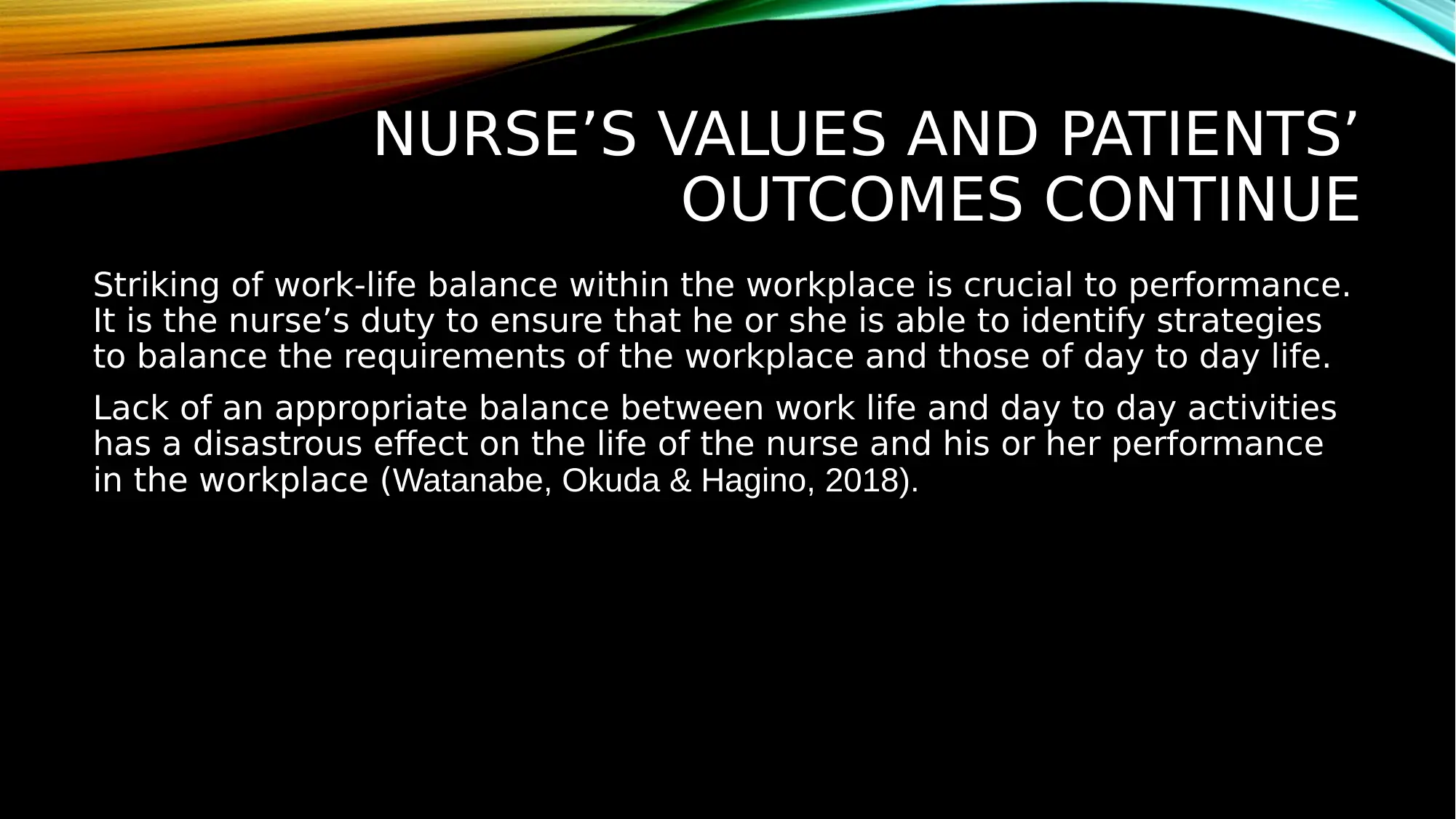
NURSE’S VALUES AND PATIENTS’
OUTCOMES CONTINUE
Striking of work-life balance within the workplace is crucial to performance.
It is the nurse’s duty to ensure that he or she is able to identify strategies
to balance the requirements of the workplace and those of day to day life.
Lack of an appropriate balance between work life and day to day activities
has a disastrous effect on the life of the nurse and his or her performance
in the workplace (Watanabe, Okuda & Hagino, 2018).
OUTCOMES CONTINUE
Striking of work-life balance within the workplace is crucial to performance.
It is the nurse’s duty to ensure that he or she is able to identify strategies
to balance the requirements of the workplace and those of day to day life.
Lack of an appropriate balance between work life and day to day activities
has a disastrous effect on the life of the nurse and his or her performance
in the workplace (Watanabe, Okuda & Hagino, 2018).
Paraphrase This Document
Need a fresh take? Get an instant paraphrase of this document with our AI Paraphraser
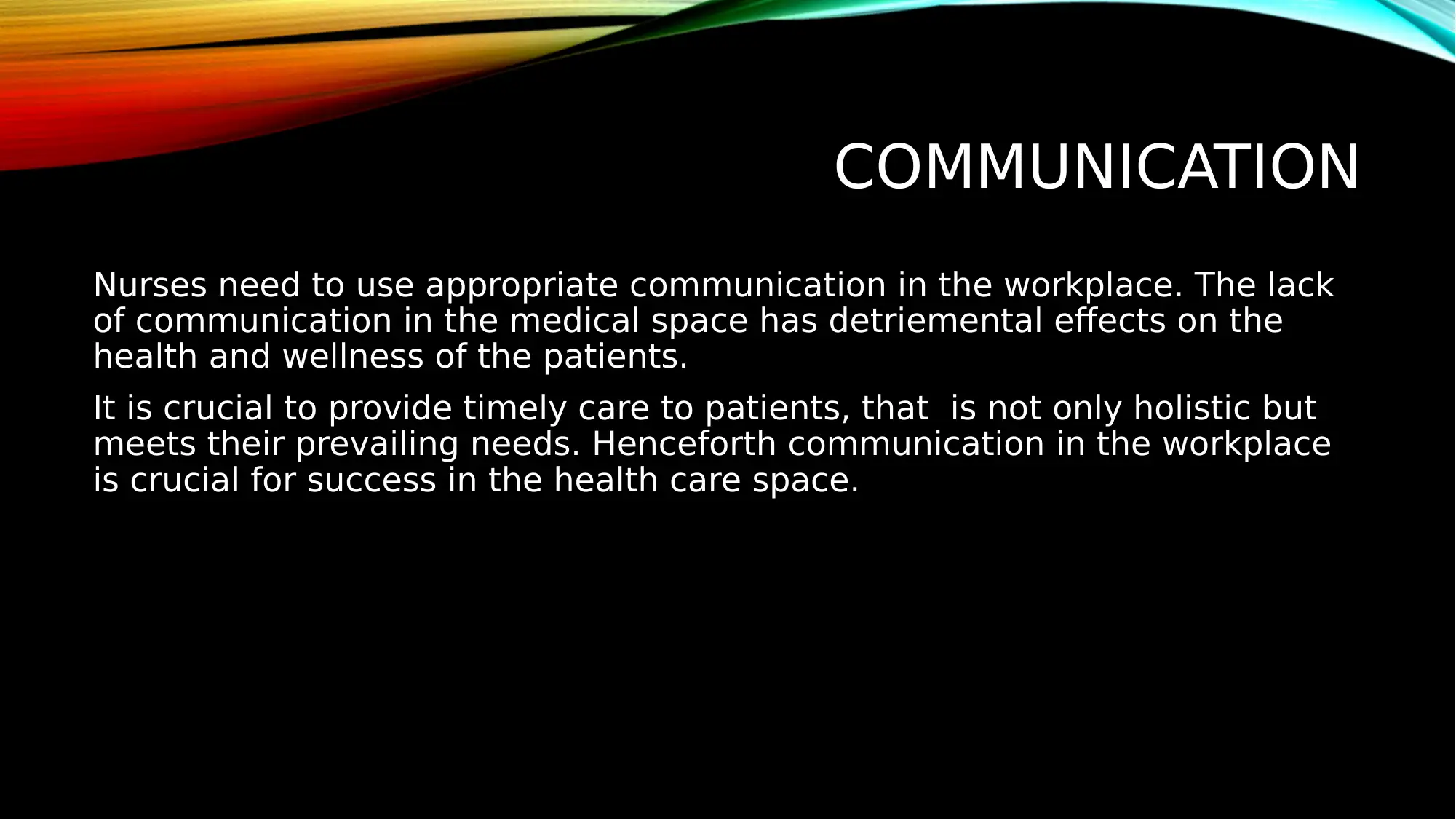
COMMUNICATION
Nurses need to use appropriate communication in the workplace. The lack
of communication in the medical space has detriemental effects on the
health and wellness of the patients.
It is crucial to provide timely care to patients, that is not only holistic but
meets their prevailing needs. Henceforth communication in the workplace
is crucial for success in the health care space.
Nurses need to use appropriate communication in the workplace. The lack
of communication in the medical space has detriemental effects on the
health and wellness of the patients.
It is crucial to provide timely care to patients, that is not only holistic but
meets their prevailing needs. Henceforth communication in the workplace
is crucial for success in the health care space.

COMMUNICATION IN THE
WORKPLACE
Communication is the process through which meaning is transnsfered trom
one person to another.
The communication process is made up of a sender, a channel, a reciever
and feedback loop.
However, communicaiton is affected by a set of factors including bias, the
culture of the people invovled, the language among many others (van den
Eertwegh et al., 2015).
WORKPLACE
Communication is the process through which meaning is transnsfered trom
one person to another.
The communication process is made up of a sender, a channel, a reciever
and feedback loop.
However, communicaiton is affected by a set of factors including bias, the
culture of the people invovled, the language among many others (van den
Eertwegh et al., 2015).
⊘ This is a preview!⊘
Do you want full access?
Subscribe today to unlock all pages.

Trusted by 1+ million students worldwide
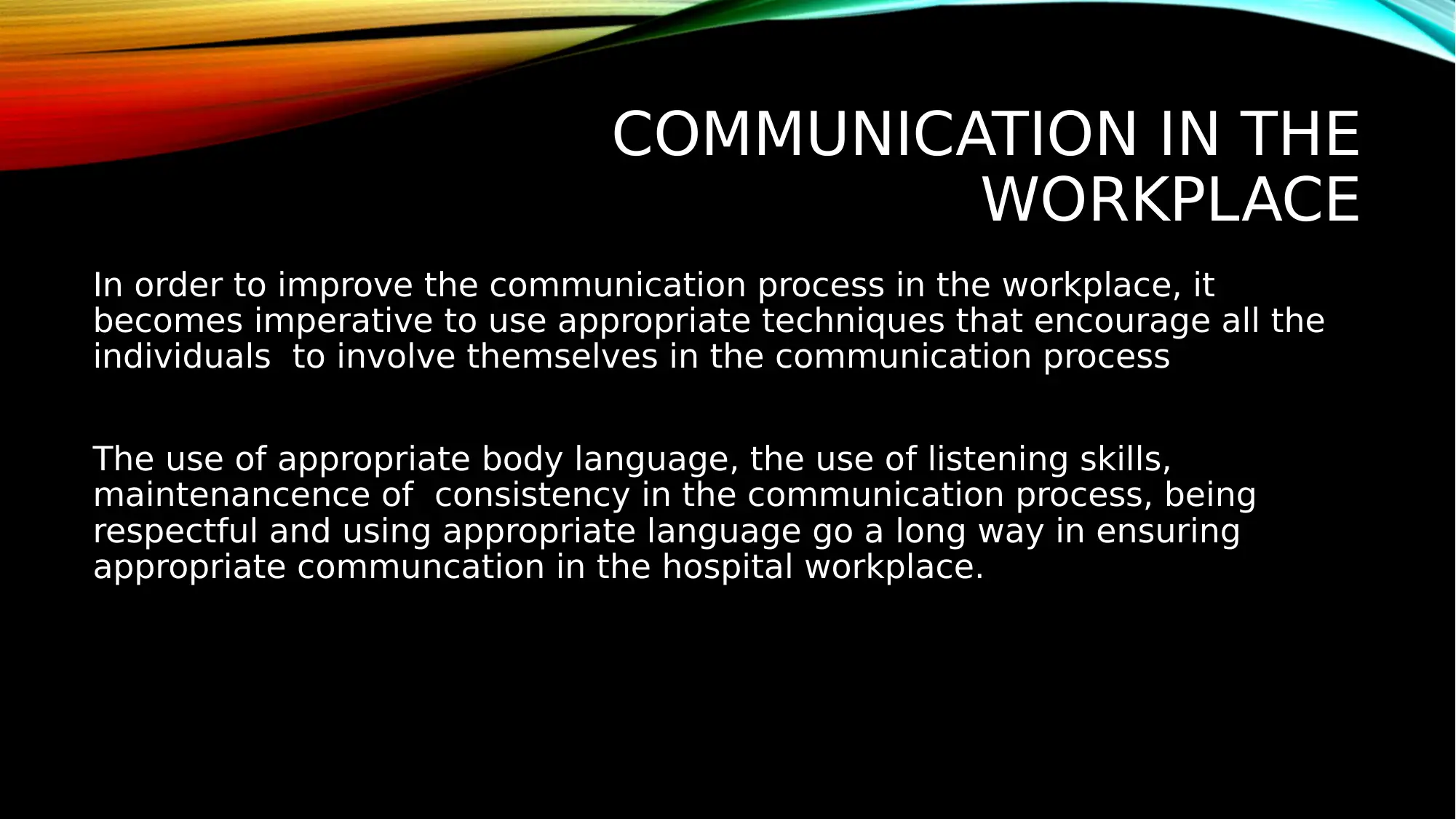
COMMUNICATION IN THE
WORKPLACE
In order to improve the communication process in the workplace, it
becomes imperative to use appropriate techniques that encourage all the
individuals to involve themselves in the communication process
The use of appropriate body language, the use of listening skills,
maintenancence of consistency in the communication process, being
respectful and using appropriate language go a long way in ensuring
appropriate communcation in the hospital workplace.
WORKPLACE
In order to improve the communication process in the workplace, it
becomes imperative to use appropriate techniques that encourage all the
individuals to involve themselves in the communication process
The use of appropriate body language, the use of listening skills,
maintenancence of consistency in the communication process, being
respectful and using appropriate language go a long way in ensuring
appropriate communcation in the hospital workplace.
Paraphrase This Document
Need a fresh take? Get an instant paraphrase of this document with our AI Paraphraser
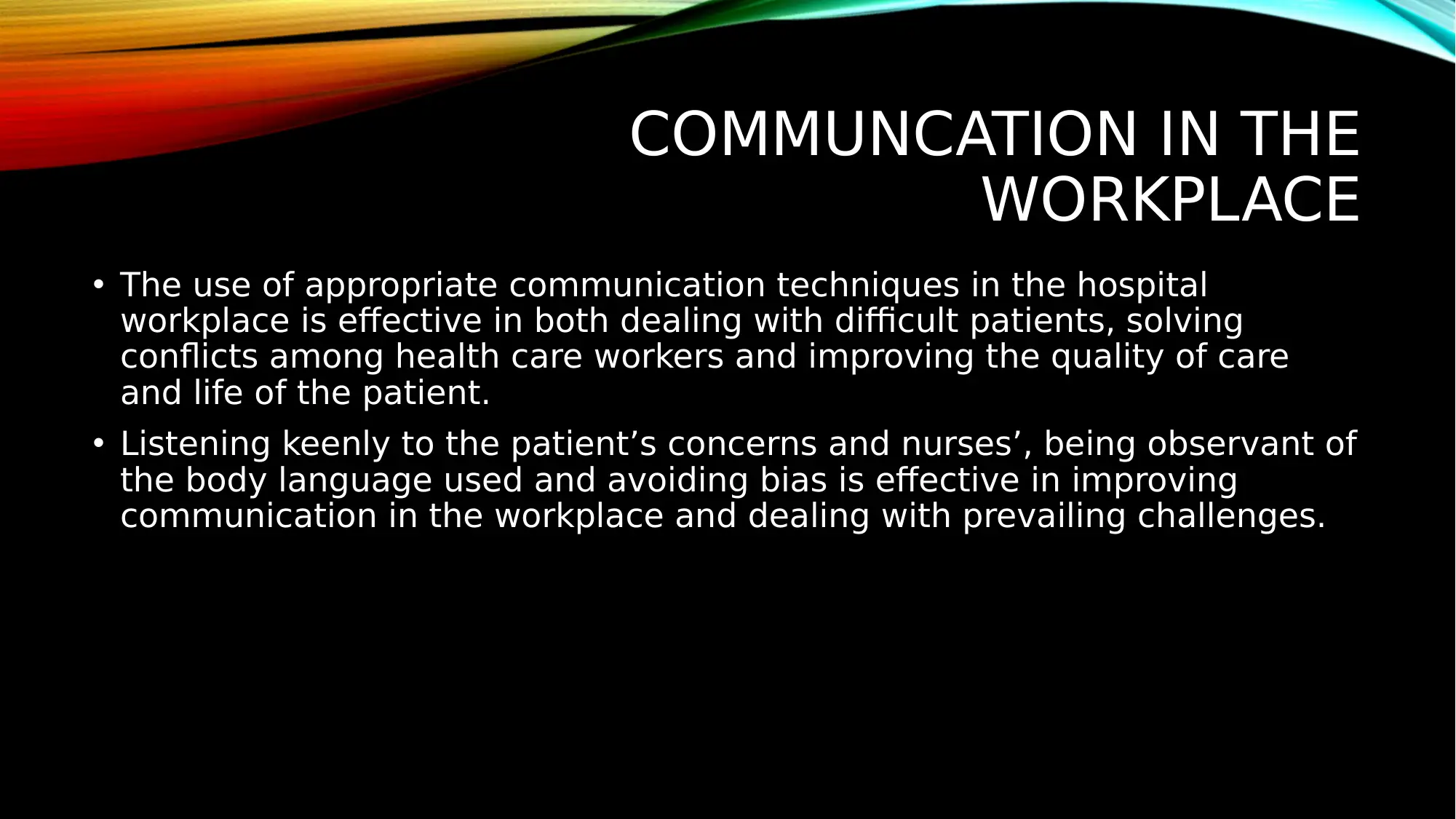
COMMUNCATION IN THE
WORKPLACE
• The use of appropriate communication techniques in the hospital
workplace is effective in both dealing with difficult patients, solving
conflicts among health care workers and improving the quality of care
and life of the patient.
• Listening keenly to the patient’s concerns and nurses’, being observant of
the body language used and avoiding bias is effective in improving
communication in the workplace and dealing with prevailing challenges.
WORKPLACE
• The use of appropriate communication techniques in the hospital
workplace is effective in both dealing with difficult patients, solving
conflicts among health care workers and improving the quality of care
and life of the patient.
• Listening keenly to the patient’s concerns and nurses’, being observant of
the body language used and avoiding bias is effective in improving
communication in the workplace and dealing with prevailing challenges.
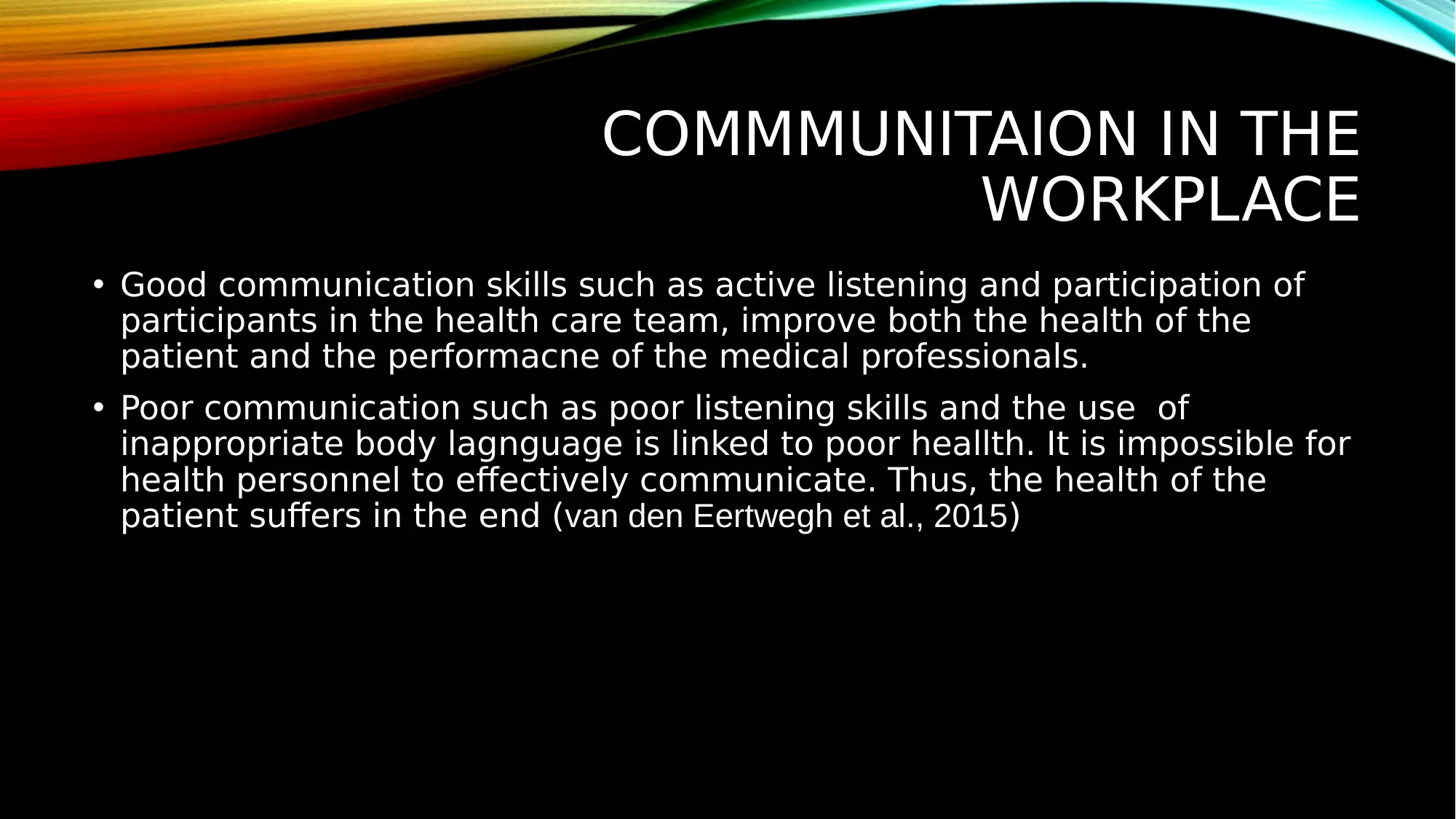
COMMMUNITAION IN THE
WORKPLACE
• Good communication skills such as active listening and participation of
participants in the health care team, improve both the health of the
patient and the performacne of the medical professionals.
• Poor communication such as poor listening skills and the use of
inappropriate body lagnguage is linked to poor heallth. It is impossible for
health personnel to effectively communicate. Thus, the health of the
patient suffers in the end (van den Eertwegh et al., 2015)
WORKPLACE
• Good communication skills such as active listening and participation of
participants in the health care team, improve both the health of the
patient and the performacne of the medical professionals.
• Poor communication such as poor listening skills and the use of
inappropriate body lagnguage is linked to poor heallth. It is impossible for
health personnel to effectively communicate. Thus, the health of the
patient suffers in the end (van den Eertwegh et al., 2015)
⊘ This is a preview!⊘
Do you want full access?
Subscribe today to unlock all pages.

Trusted by 1+ million students worldwide
1 out of 15
Related Documents
Your All-in-One AI-Powered Toolkit for Academic Success.
+13062052269
info@desklib.com
Available 24*7 on WhatsApp / Email
![[object Object]](/_next/static/media/star-bottom.7253800d.svg)
Unlock your academic potential
Copyright © 2020–2025 A2Z Services. All Rights Reserved. Developed and managed by ZUCOL.




